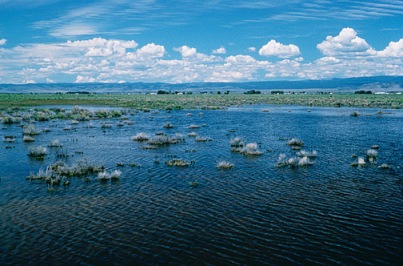Habitat and Geography
If you were
wondering where to go to find once of the voracious predators,
well you are in luck. Esox lucius can be found in several
places around the world, including the polar regions. In North
America they can be found in the Atlantic, Pacific, Great Lakes,
and Mississippi River from Labrador to Alaska. States that pike
are native to are Pennsylvania, Missouri, and Nebraska. Along
with also being present to North America, Esox lucius
are also native to parts of Europe. They can be found in Europe
from France to eastern Siberia and then south to northern Italy
excluding northern Norway and northern Scotland. Northern Pike
can also be found in several others places where it has been
introduced.
Esox lucius are found all over the globe and the
reason is is because they can live and survive in a variety of
habitats. Pike are usually found in freshwater though recently
discovered to live in water with a little lower salinity than
the ocean. Areas in which pike usually live would be clear
vegetated lakes, quiet pools, creeks, and small to large rivers,
but pike can live from cold deep lakes to muddy rivers.
Though pike can be found in all these different bodies of water, they tend to live in certain areas of them. Pike are normally found close to shore in shallow vegetative areas, though they do not stay in the same area all the time; pike are known to travel all around. Pike usually like to stay in shallow areas but it has been shown that they will head to places farther from shore when it is windy. One thing to remember about pike though is that this is their preferred habitat but they have the ability to live in several others in any case they want to find prey.
If you would like to read more about pike behavior then I suggest you check out the "Journal of Fish Biology", online at http://www.blackwell-synergy.com/doi/abs/10.1111/j.1095-8649.1984.tb04855.x. If you are interested in watching a pike in its habitat I suggest this YouTube video, http://www.youtube.com/watch?v=N23ZNVybr1s.
Website created Spring 2008 by Brian Haslag
